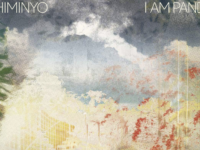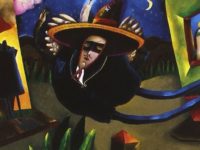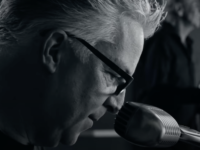What do you call a combination of country-esque vocal delivery, protest lyrics, spoken word and modern production? In this case at least, you call it Future Cowboys. Jamie Bernstein, Eren Cannata and Miguel Oliveira meld their talents into a musical mélange that bridges numerous genres: Rock, reggae and folk sit (sometimes uncomfortably) alongside hip hop and Americana.
Bernstein is a musician, producer and actor, who frequently performs roots-style music around New Orleans and elsewhere. He hosts a show on the New Orleans radio station WHIV, an outreach arm of the non-profit New Orleans Society for Infectious Disease Awareness. His acting credits include Treme, Preacher, and American Horror Story.
Cannata is an Emmy award-winner and co-owner of Cove City Sound Studios who grew up around Billy Joel and the Beach Boys, with whom his dad played. He’s worked with Demi Lovato, Ryan Lewis, Paul Simon, Idina Menzel, Bebe Rexha and numerous others.
Oliveira is a singer and songwriter and works in developing new artists; his lifelong love for music surfaced after a long career in the news broadcasting field, working with Peter Jennings, Diane Sawyer, Anderson Cooper and Paula Zahn. He served as a news anchor, reporter, field producer and operations producer before turning full time to music.
With such varied backgrounds, it’s probably no surprise that Future Cowboys bounces back and forth between so many styles. Jamie Bernstein grew up in Appalachia and has lived in New Orleans for several years, and both those environments obviously played a large role in Life On Mars. That’s evident on songs like the title track, which is not to be confused with the David Bowie tune. It features the Soul Brass Band in a funky dance arrangement, and is given the full hip-hop treatment, with the reverb on the vocals turned up to 11.
“The Heat” features Eren’s father Richie Cannata, Billy Joel’s longtime saxophonist, in a New Orleans-inspired homage to Dr. John. The saxophone and piano come and go, while the drums, bass and handclaps keep rumbling throughout the song.
Lyrically the band is – interesting. The title track on Life On Mars advocates for bringing about social change by exchanging gunfire for knowledge: “We’re just cowboys from the future, we traded guns for peace … cuz knowledge is power.” Hey, just like School House Rock (we miss you, Jack Sheldon). At the other extreme is the hypnotic, repetitious words set off to a rolling, reggae-fied beat on “Party”: “Party, Party, P-A-R-T-Y, That’s how we do it.”
It’s not all originals, but Future Cowboys make the songs their own. Example A: This is not your grandparents’ “Home On the Range.” It’s been updated both sonically and lyrically, as it bemoans the treatment given the animals and environment, predicting similar results for humanity.
With its frequent spoken-word segments, Life On Mars also brings to mind Remain in Light-era Talking Heads, even Flash and the Pan, the obscure Australian project from the 1970s helmed by Harry Vanda and George Young from the Easybeats. There’s lots of echo and reverb, with a hip hop here, a gospel backup there, and let’s throw in a little twang. This isn’t music for the faint of heart.
What if Riders in the Sky and Leon Russell decided to work with A Tribe Called Quest, with the Roots serving as producers? There’s probably a reason no one ever asked that question, but nevertheless, Future Cowboys provides the answer. Saddle up.
- Jon Anderson, Reza Khan, CSNY + Others: Ross Boissoneau’s Best of 2024 - December 30, 2024
- Tower of Power, Jennifer Hudson, Ben Folds + Others: 2024’s Seasonal Sounds - November 25, 2024
- Dave Bainbridge of Downes Braide Association: The Albums That Shaped My Career - October 9, 2024




